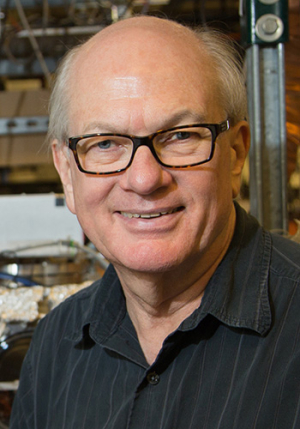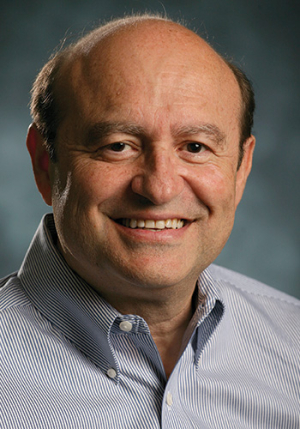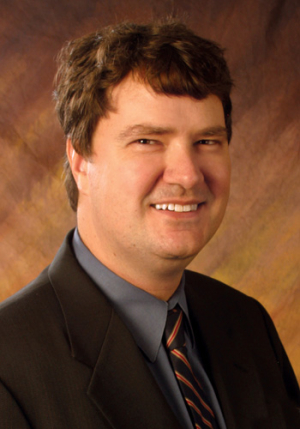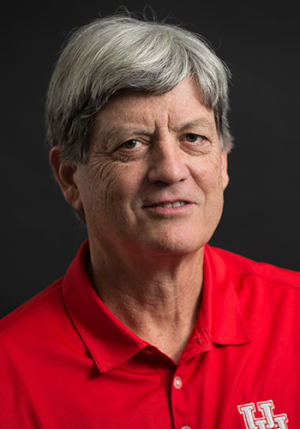Each year, the university recognizes excellence in teaching, service, research and scholarship through a variety of awards given to faculty.
Presented during the 32nd Annual University of Houston Faculty Awards Ceremony April 27, five engineering professors were honored for their distinguished contributions to the university.
Excellence in Research and Scholarship Award
Stanko Brankovic and Vincent Donnelly are among six to receive the 2010 Excellence in Research and Scholarship Award, given each year to faculty who have achieved a substantial record of outstanding research, scholarship or creative activities in their field. The award carries a $5,000 stipend and a plaque.
Stanko Brankovic, assistant professor of electrical and computer engineering
Brankovic started off his career as a researcher publishing a synopsis of his doctoral work in the prestigious journal, Science. A decade later, he has continued to accomplish big things in the scientific community.
“Dr. Brankovic joined the University of Houston as a world recognized researcher already with an established name and impact in several fields,” said Dmitri Litvinov, a professor of electrical and computer engineering and Brankovic’s research colleague. “His visionary ideas and original work on the synthesis of soft high moment magnetic materials and nanostructures has put the University of Houston’s name on the map of the $108 billion magnetic recording industry. Not to mention, his original work not only in this area, but others has brought abundant funding and recognition to our institution. We have no doubt that the best and the most productive time of his career is yet to come.”
Brankovic served as a postdoctoral associate at Brookhaven National Laboratory and as a research staff member at Seagate Research Center before joining UH. In these roles, he has made many significant accomplishments. He holds a patent for the world’s most efficient catalyst for polymer electrolyte membrane fuel, has developed new methods for advancing the electrocatalysis field and even created a magnetic material still used today in magnetic heads for the magnetic recording industry.
It was these successes as well as his original ideas for future research that earlier this year earned him the coveted National Science Foundation’s Faculty Early Career Development (CAREER) Award. It’s given to junior faculty who are expected to become academic leaders based on their performance, so far, as researchers and educators. For Brankovic, receiving the Excellence in Research and Scholarship Award from the university so soon after the CAREER Award is no short of surprising.
"I feel honored that the university recognizes my contributions as a researcher and scholar," said Brankovic. "Since I joined the University of Houston in 2005, it was a journey with many ups and downs. This award motivates me to further pursue the path of excellence and I hope that it represents the dawn of even better things to come."
Brankovic earned his bachelor’s degree in chemical and biochemical engineering from the University of Belgrade in 1994 and his Ph.D. in science and engineering of materials at Arizona State University in 1999. In addition to being a member of the electrical and computer engineering faculty at the Cullen College, he holds joint appointments in the chemical and biomolecular engineering and chemistry departments.
Vincent Donnelly, professor of chemical and biomolecular engineering
Donnelly is an innovator in his field. Both in industry and since his transition into academia at the University of Houston, he has achieved breakthroughs that have not only earned him an international reputation, but stand to change the way things are done in the areas of plasma engineering and nanomaterials.
“Dr. Donnelly makes clever use of the fundamentals to produce methodologies or techniques that have lasting impact on both the academic and industrial communities,” said Ramanan Krishnamoorti, chair of the department of chemical and biomolecular engineering. “Importantly, he developed Trace Rare Gas Optical Emission Spectroscopy (TRG-OES), to non-intrusively measure critical plasma parameters, such as reactive radical densities and electron energy distributions functions. This technique is now used by dozens of investigators around the globe and has provided a wealth of basic information on plasma physics and chemistry.”
Donnelly holds 11 patents and has two others pending—one of which is for a novel technique he developed alongside other UH researchers. Called nanopantography, it could, for the first time, allow nano-devices to be mass-produced. More than 150 papers on this work, and much of his other research, has been featured in top chemistry, applied physics, materials science and engineering journals.
A fellow of the American Vacuum Society, Donnelly is a recipient of the organization’s prestigious, Plasma Prize, as well as a host of other honors from AT&T Bell Laboratories, the American Institute of Chemists, the Cullen College of Engineering, National Research Council and LaSalle University.
Despite all this, he is still honored to receive the university’s Research in Excellence and Scholarship Award.
“It is an honor to be chosen to receive this award, particularly because it is one of only two research and scholarship awards given annually to full professors by the University of Houston,” said Donnelly. “Having spent most of my career in industry, it is also nice to receive an award for the academic research that I am now conducting.”
Donnelly joined the university in 2002 following a 22-year career at AT&T Bell Laboratories in Murray Hill, NJ. He holds both a bachelor’s degree in chemistry from LaSalle University and a Ph.D. in physical chemistry from the University of Pittsburgh.
Teaching Excellence Award: Instructor/Clinical
Micky Fleischer has always gone above and beyond when it comes to teaching.
An adjunct professor of chemical and biomolecular engineering, Fleischer often devotes nights and weekends to helping students grasp course material.
“Many times when the class needed extra instruction or questions answered, Dr. Fleischer would schedule a time on Saturday for the class to meet,” said Salvatore Mangione (2006 BSChE), a former student and now a production manager at Occidental Petroleum. “These Saturday sessions were a hallmark of his classes and an example of his dedication to his students. His office was always open and he was always willing to work with students one-on-one.”
His dedication to teaching, during his 30-year tenure, is why he was given the Teaching Excellence Award in the instructor/clinical category. The honor came with a trophy and a $5,000 prize.
Though it’s one of many awards he has received recognizing his extraordinary teaching ability, Fleischer is still touched.
“There are so many good teachers in the university, so being nominated was already an honor,” said Fleischer. “I always liked teaching. I started in Chile while I was an undergraduate — initiated what's called a "pre-university," helping high school students apply and successfully get into college. I have just always loved that interaction with students.”
After earning two bachelor’s degrees, one in chemical engineering and the other in industrial engineering from the Universidad Catolica de Chile in 1973, Fleischer went on to pursue both a master’s and Ph.D. in chemical engineering from UH in 1975 and 1978, respectively. In 1975, he began his teaching career at the university as a instructor. By 1977, he was hired on at Shell, and began his juggling act—teaching two courses a year at UH while working full time in a variety of research and management capacities at Shell. In 2003, Fleischer said, UH made him an offer he couldn’t refuse—the opportunity to teach more classes as an adjunct professor.
“I was toying with the idea to retire from Shell, so I did,” he remembers. “I had an excellent career in Shell, but it was time to switch gears.”
He now teaches five undergraduate courses each year. In his classes, Fleischer incorporates examples from his own real-world experience in addition to bringing in industry representatives to expand on textbook theory. It’s all in an effort to prepare his students, as best he can, for what they will face after graduation.
“Dr. Fleischer has high standards and he instills these high standards amongst his students in chemical and biomolecular engineering while still being their confidante and mentor,” said Ramanan Krishnamoorti, chair of the department of chemical and biomolecular engineering. “The warmth of friendship and respect that he receives from his current students and alumni is truly remarkable. Not to mention, he has consistently been an outstanding teacher as measured through teaching evaluations.”
This all comes easy for Fleischer. For as he puts it, he is doing exactly what he loves.
“I have it in my blood,” he said of teaching. “I love to be part of their (students) lives, to motivate them, to help them learn, to be happy and to be successful professionals. I can't picture my life without it.”
John and Rebecca Moores Professor
Richard Willson, a professor of chemical and biomolecular engineering was one of two University of Houston faculty members to be named this year’s John and Rebecca Moores Professor.
The five-year renewable award is given to faculty who are outstanding in teaching, research and service. It comes with a $10,000 annual stipend.
“It is a great honor to be named a Moores Professor at UH,” said Willson. “It's very competitive, and I have a great deal of respect for my colleagues who have received this honor before me.”
Willson earned both his bachelor’s and master’s degrees from the California Institute of Technology and his Ph.D. in chemical engineering from the Massachusetts Institute of Technology in 1981, 1982 and 1988, respectively. He joined the faculty at UH in 1988, and currently holds a joint appointment in biochemical and biophysical sciences.
Beyond teaching, for more than two decades he has worked to identify and analyze individual protein, DNA molecule and disease organisms. This work, which he already has been awarded patents for, is helping develop everything from biosensors to better detect cancer to a quick and accurate test for the Norwalk Virus, also known as the cruise ship virus.
Esther Farfel Award
Stuart Long, a professor of electrical and computer engineering, was this year’s recipient of the university’s highest faculty honor: The Esther Farfel Award. A symbol of overall career excellence, it recognizes a professor who is a superior teacher, researcher and community member. The title carries with it a $10,000 prize and a trophy. His announcement as the 2010 recipient makes him the seventh professor from the Cullen College of Engineering to be given the prestigious honor in the 32-year history of the award.
Long began his career at UH in 1974. Since this time, he has found countless ways to give back to the campus community not only as an educator, but also as an administrator.
Read the full story on Long.




